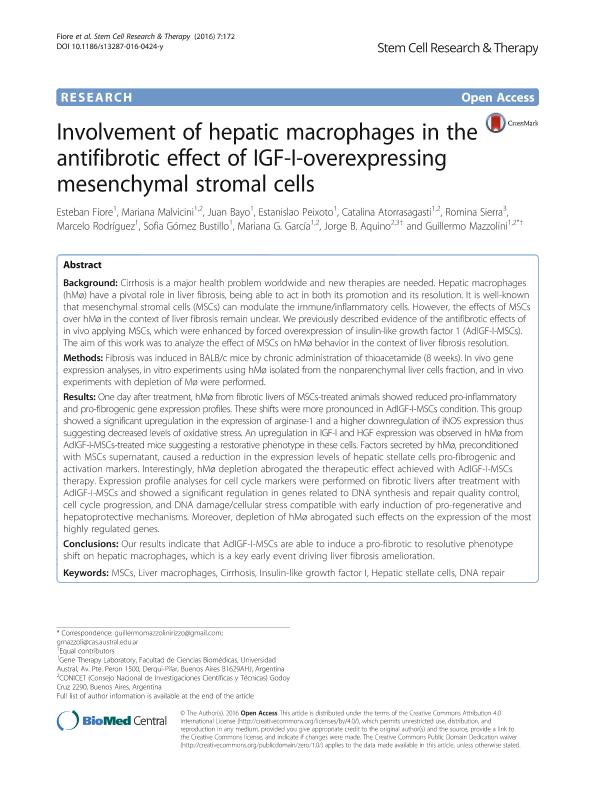Artículo
Involvement of hepatic macrophages in the antifibrotic effect of IGF-I-overexpressing mesenchymal stromal cells
Fiore, Esteban Juan ; Malvicini, Mariana
; Malvicini, Mariana ; Bayo Fina, Juan Miguel
; Bayo Fina, Juan Miguel ; Peixoto, Estanislao
; Peixoto, Estanislao ; Atorrasagasti, María Catalina
; Atorrasagasti, María Catalina ; Sierra, Romina
; Sierra, Romina ; Rodriguez, Marcelo; Gomez Bustillo, Sofia
; Rodriguez, Marcelo; Gomez Bustillo, Sofia ; García, Mariana Gabriela
; García, Mariana Gabriela ; Aquino, Jorge Benjamin
; Aquino, Jorge Benjamin ; Mazzolini Rizzo, Guillermo Daniel
; Mazzolini Rizzo, Guillermo Daniel
 ; Malvicini, Mariana
; Malvicini, Mariana ; Bayo Fina, Juan Miguel
; Bayo Fina, Juan Miguel ; Peixoto, Estanislao
; Peixoto, Estanislao ; Atorrasagasti, María Catalina
; Atorrasagasti, María Catalina ; Sierra, Romina
; Sierra, Romina ; Rodriguez, Marcelo; Gomez Bustillo, Sofia
; Rodriguez, Marcelo; Gomez Bustillo, Sofia ; García, Mariana Gabriela
; García, Mariana Gabriela ; Aquino, Jorge Benjamin
; Aquino, Jorge Benjamin ; Mazzolini Rizzo, Guillermo Daniel
; Mazzolini Rizzo, Guillermo Daniel
Fecha de publicación:
11/2016
Editorial:
Bio med central
Revista:
Stem cell research & therapy
ISSN:
1757-6512
Idioma:
Inglés
Tipo de recurso:
Artículo publicado
Clasificación temática:
Resumen
BACKGROUND:Cirrhosis is a major health problem worldwide and new therapies are needed. Hepatic macrophages (hMø) have a pivotal role in liver fibrosis, being able to act in both its promotion and its resolution. It is well-known that mesenchymal stromal cells (MSCs) can modulate the immune/inflammatory cells. However, the effects of MSCs over hMø in the context of liver fibrosis remain unclear. We previously described evidence of the antifibrotic effects of in vivo applying MSCs, which were enhanced by forced overexpression of insulin-like growth factor 1 (AdIGF-I-MSCs). The aim of this work was to analyze the effect of MSCs on hMø behavior in the context of liver fibrosis resolution.METHODS:Fibrosis was induced in BALB/c mice by chronic administration of thioacetamide (8 weeks). In vivo gene expression analyses, in vitro experiments using hMø isolated from the nonparenchymal liver cells fraction, and in vivo experiments with depletion of Mø were performed.RESULTS:One day after treatment, hMø from fibrotic livers of MSCs-treated animals showed reduced pro-inflammatory and pro-fibrogenic gene expression profiles. These shifts were more pronounced in AdIGF-I-MSCs condition. This group showed a significant upregulation in the expression of arginase-1 and a higher downregulation of iNOS expression thus suggesting decreased levels of oxidative stress. An upregulation in IGF-I and HGF expression was observed in hMø from AdIGF-I-MSCs-treated mice suggesting a restorative phenotype in these cells. Factors secreted by hMø, preconditioned with MSCs supernatant, caused a reduction in the expression levels of hepatic stellate cells pro-fibrogenic and activation markers. Interestingly, hMø depletion abrogated the therapeutic effect achieved with AdIGF-I-MSCs therapy. Expression profile analyses for cell cycle markers were performed on fibrotic livers after treatment with AdIGF-I-MSCs and showed a significant regulation in genes related to DNA synthesis and repair quality control, cell cycle progression, and DNA damage/cellular stress compatible with early induction of pro-regenerative and hepatoprotective mechanisms. Moreover, depletion of hMø abrogated such effects on the expression of the most highly regulated genes.CONCLUSIONS:Our results indicate that AdIGF-I-MSCs are able to induce a pro-fibrotic to resolutive phenotype shift on hepatic macrophages, which is a key early event driving liver fibrosis amelioration.
Palabras clave:
Liver Fibrosis
,
Mesenchymal Stromal Cell
,
Hepatic Macrophages
,
Igf1
Archivos asociados
Licencia
Identificadores
Colecciones
Articulos(IIMT)
Articulos de INSTITUTO DE INVESTIGACIONES EN MEDICINA TRASLACIONAL
Articulos de INSTITUTO DE INVESTIGACIONES EN MEDICINA TRASLACIONAL
Articulos(SEDE CENTRAL)
Articulos de SEDE CENTRAL
Articulos de SEDE CENTRAL
Citación
Fiore, Esteban Juan; Malvicini, Mariana; Bayo Fina, Juan Miguel; Peixoto, Estanislao; Atorrasagasti, María Catalina; et al.; Involvement of hepatic macrophages in the antifibrotic effect of IGF-I-overexpressing mesenchymal stromal cells; Bio med central; Stem cell research & therapy; 7; 11-2016; 172
Compartir
Altmétricas



